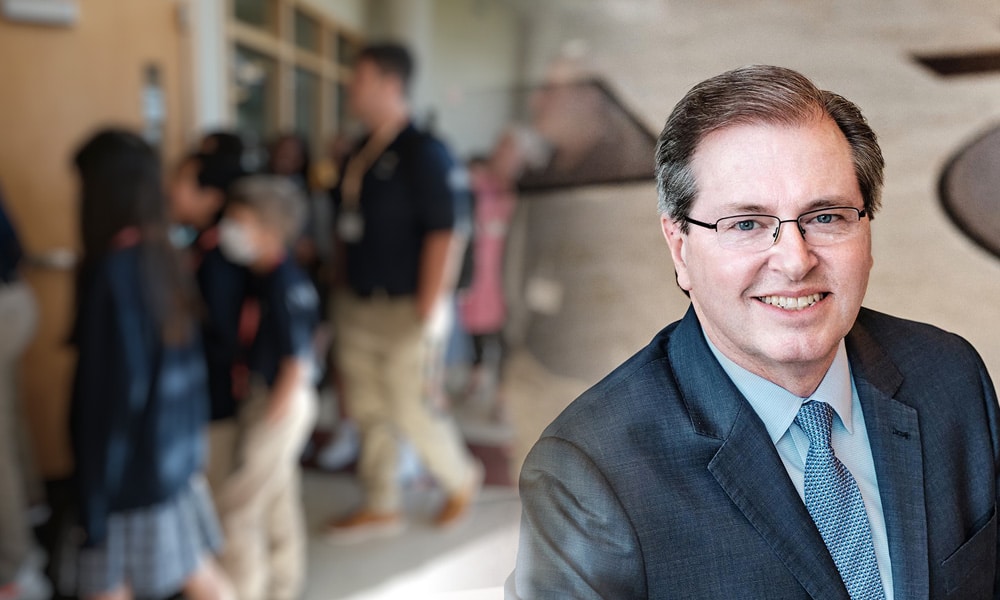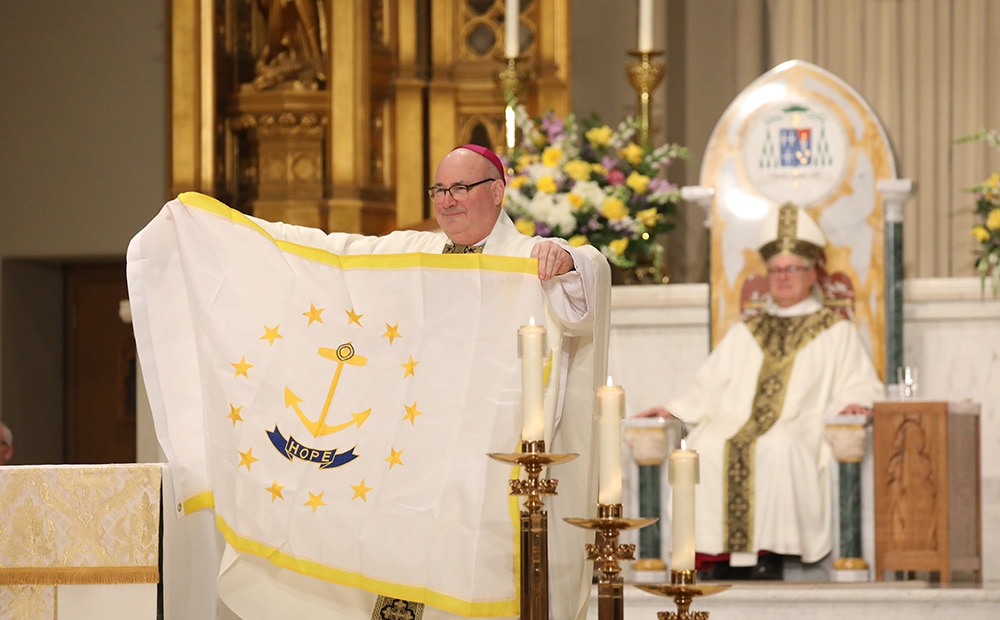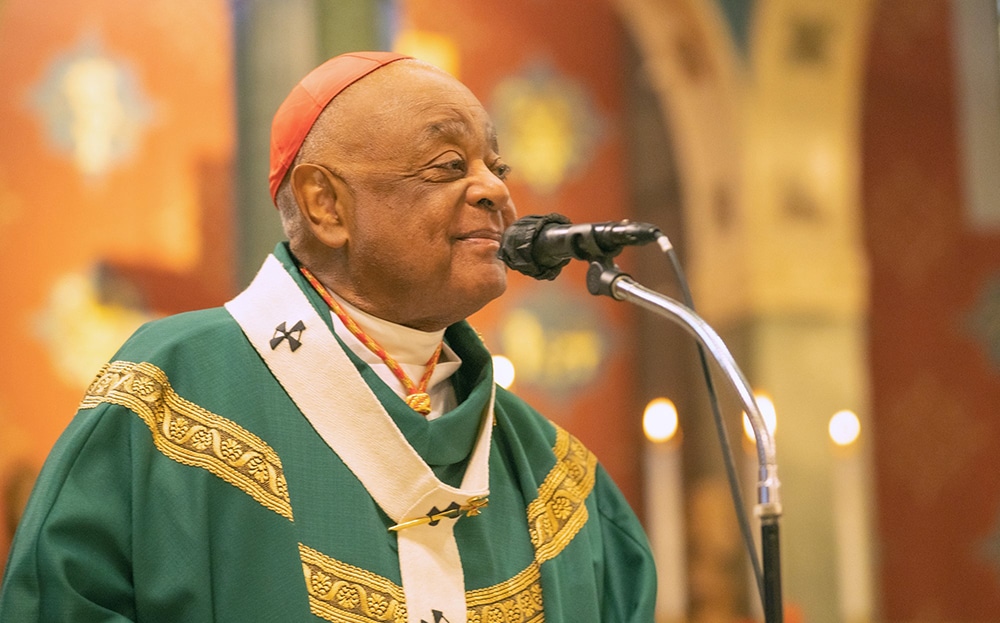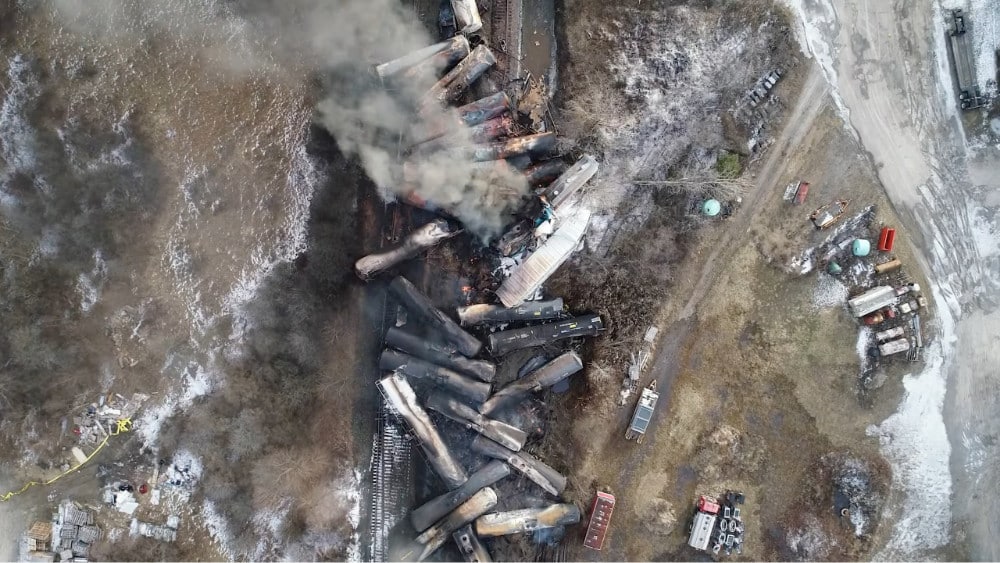As we observe National Catholic Schools Week, Our Sunday Visitor sat down with Thomas Carroll, Superintendent of Schools of the Archdiocese of Boston. Carroll joined the archdiocese in 2019, when he began his project of renewal of Boston’s Catholic education. Carroll’s background includes a host of advocacy and development work, including serving as the president of the Invest in Education Foundation, based in New York.
At the time of his appointment, Cardinal Seán O’Malley, archbishop of Boston, said, “Tom brings a wide range of experience to this important role, including founding and running successful urban schools, and we look forward to supporting his efforts to strengthen Catholic education.” But, as Carroll freely admits, he’s a bit of an outsider to Catholic education, which is perhaps why he sees so clearly its deficiencies and its promise.
This interview has been edited for length and clarity.
Our Sunday Visitor: Many people say that the greatest challenges that Catholic elementary schools face are financial, which is, of course, closely related to enrollment. Is that true in your experience? What’s the biggest challenge that these schools are really facing?
Thomas W. Carroll: I think the biggest challenge they’re facing is a lack of vision. Another is a lack of staff that are committed to evangelization.
Lots of people have shown that if you have the right vision and you have people who are witnesses, parents will come and the enrollment will follow. And when the enrollment follows, the finances improve. In Boston, we’ve been like much of the country in a period of more than 60 years of decline. But in the last 3-4 years, it’s been pretty stable. When COVID first hit, we dropped pretty dramatically, but we climbed out of that hole and we’re doing great now. At some point, though, you can’t deny 65 years of gravity; that’s gonna come back with a vengeance, and the federal money that’s coming to us indirectly is eventually going to evaporate.
I think the schools that have a clear vision and that are committed to their central mission of helping children grow in virtue will be around for a long time. The tides come and go. The tide has come in pretty well for us, but at some point the tides are gonna go out, and the people who don’t get their act together are gonna get washed out when the tide recedes. I think it’s as simple as that. So I’m in a mad rush to try to convince people to stay on mission.
Our Sunday Visitor: How can our Catholic schools be places of vibrant mission? In other words, what do we need to do to make sure every graduate is a missionary disciple?
Carroll: I’ve put in roughly, through a combination of ways, about 35 new parochial school principals. I will have replaced 45 by the time I get to July 1. Most of that is through attrition. I’ve only fired a single principal, and pastors have helped another five or six to move on.
I have been very deliberate about putting in a religious screen for anybody who’s hired. It used to be if you identified as Catholic, whatever that means, that was kind of the bare minimum requirement. But I agree with Pope St. Paul VI that modern man listens more willingly to witnesses than to teachers, and if he listens to teachers, it’s because they’re witnesses.
I spent a very large portion of my time recruiting talent. I’ve never seen a successful school run by somebody of mediocre talent, and I’ve never seen a school that had inspired leadership close. So I’ve been zigzagging across the country, hopping on trains, planes and automobiles in this search for graduating seniors who are faithful and smart, who are intellectually curious, have a work ethic and a lot of grit. With some help, I’ll recruit 50 this year and then grow beyond that. I’m finding a tremendous amount of talent out there, finding lots of young adults with missionary zeal.
Our Sunday Visitor: Why is missionary spirit now at the forefront of your vision for Catholic schools? Do they really have the ability to evangelize?
Carroll: Over time, Boston has become mission territory. That’s our challenge, and you know, as has been pointed out, we’re now in an apostolic age. We can’t assume that people are going to come, and we can’t assume that just because somebody in the hierarchy proclaims something that everybody’s gonna necessarily follow. But I’m finding the most beautifully faithful young men and women across the country. I joke that I’m gonna put on my business card that I’m a fisher of men and women.
But all this evangelization begins with the recognition that something is not quite right. Think of the AA model — you can’t recover if you don’t first admit you have a problem, right? We have a problem. Cardinal Dolan, in an interview in America magazine, once said Catholic education has become hospice care. We know the patient’s dying, and we’re trying to mitigate the pain. Now that’s his dark Irish sense of humor. So you know … he didn’t intend that in the context of the desired state, but that that’s effectively what it’s become.
Our Sunday Visitor: Is personnel the only major thing that inhibits missionary vision from taking root in our schools?
Carroll: Another problem is that we’ve allowed mass market textbooks into our classrooms that are identical to the mass market textbooks in public schools. A mass market textbook manufacturer obviously will not put out a book that can’t get approved in California, which is a textbook adoption state. But as I said to one priest, would you pick the politicians in California as your religious curriculum review committee? I don’t think that the textbook companies are biased against the Catholic Church. I think they’re biased against controversy, because controversy leads to people not buying their textbooks.
Given where the culture is, every single belief of the Catholic Church is controversial. I was asked at a public meeting at a school — well, actually it was a statement: “I don’t want my daughter being taught that God created man and woman. I don’t think it’s very inclusive.” That simple statement is considered controversial? Ten years ago, nobody would have thought to remark about it at all. My response was that we would talk about a lot of things that evening, but repealing 2,000 years of Church teaching would not be among them. But this is the culture that we are in right now, and I don’t know that this is the time to shy away.
Our Sunday Visitor: So what does that mean for the future?
Carroll: I’m actually very hopeful for the future of Catholic schools. If you look generationally at who believes and who doesn’t believe, each successive generation is lower by dramatic numbers. A lower percentage of people believe in God or organized religion. And this comes across all the major religions. Our challenge is whether or not in a generation from now there’s going to be any young people in the pews.
If we have students in our schools, generally kids are enrolled when they’re 3 years old in preschool and we often have them through 12th grade. We have them literally for 16,000 hours. And if you can’t sell that in 16,000 hours, then maybe the people who are selling it are doing something wrong. So I don’t think Church teachings are the problem, I think the problem we have is that kids are asking legitimate questions and their teachers aren’t giving compelling answers. Kids are not stupid. When somebody’s preaching at them but they know from just a quick swipe on Instagram or Facebook that a teacher is living a life not in accord with Church teaching, it reeks of hypocrisy and incoherence. I think it’s really important to have people in the classroom that understand moral theology. And no matter what class they’re teaching, they must personally witness to the Catholic faith.
Our Sunday Visitor: Many people that are interested in promoting a vibrant Catholic minority, a rich and faithful Catholic subculture, are tending in many places toward home schooling. What do you say to parents who are trying to decide whether to home school or to place their children in a Catholic school?
Carroll: I get called all the time by parents asking for advice on what to do with their kids. And because of the seriousness of that question, I give them a very serious and honest response. It depends, I think.
When you choose a school for your child, you have to consider a few factors. First, every single person in that building is a teacher. The people who are called teachers are not the only people who will teach things to your children — the children in the school, the parents, the support staff, people in the front office. And so you have to decide whether you’re comfortable having this group of adults and children forming your child.
Second, you have to find out from a school what the organizing principle of the school is. I think there’s only one appropriate answer: We exist to draw kids closer to God to help them grow in virtue and set them on a path to eternal salvation. If they don’t say that and instead start talking about their sports teams winning a championship or that they have a new robotics lab, then that tells you an awful lot about the emphasis of the school. I’m not opposed to robotics labs, and I’m certainly not opposed to sports. There are a lot of fantastic life lessons that can come from sports, but they’re not the organizing principle of a Catholic school.
The negative of home schooling is that it’s really hard. When the kids get into middle and high school, unless you’re as accomplished as Leonardo da Vinci and equally adept in every single academic discipline, I think parents need to have humility about whether they can actually teach physics and calculus and literature and creative writing at a very high level.
Our Sunday Visitor: During your tenure in Boston, you’ve founded a classical Catholic school called Lumen Verum Academy. Can you say a little about the difference between a “classical” and “mainstream” Catholic education?
Carroll: In a Catholic or a public school, the so-called secular subjects are taught almost identically, and we use identical materials. I think that’s contrary to a Catholic worldview. Right now, across the country, we teach religion five days a week for 50 minutes or so a day. But that mentality isolates and fractures the Catholic worldview. You’re unintentionally creating in the mind of the student that being in accord with God is just a part-time thing. I think that’s an extremely subversive thought to let settle in the minds of kids and Catholic schools.
I think one of the reasons there’s a great rebirth of classical schools, particularly in the Catholic space, is people see that the Catholic classical schools are not doing that. In the classical model, every single subject is being taught in a Catholic way. Science should be taught in a context of the wonder for God’s creation, and the rationality that’s reflected in mathematics is a reflection of the order that God created in the world. I joke sometimes to my Protestant friends, to tease them a little, that we wrote the Bible and created Western civilization. I don’t mean to be uncharitable, I’m just joking. But the magnitude that we have, the largest global footprint in terms of service to the poor, the marginalized, the dispossessed … how many kids will come out of Catholic school actually knowing that? There’s no alternative to the Catholic intellectual tradition that is intellectually equal.
Our Sunday Visitor: You’ve accomplished a great deal in short order for Boston’s Catholic schools. What are some of your major influences that have helped you to refine the educational philosophy that you’re outlining here?
Carroll: The funny thing about this is that I was the only candidate for my job 3 1/2 years ago that never went to Catholic school, had never been a teacher, never been a principal, never worked in a diocese. … So I have the detachment of bringing to the job of fresh set of eyes. Plus I’m a convert to the Faith.
If you’ve been in Catholic education your entire life, you might not be able to see what’s wrong with it, because it looks like it did the day before, the year before, the decade before … there’s only less of it. I don’t think people who have spent all of their life in the Catholic system are as shocked as I am, or as alarmed, or as concerned, or believe, as I do, that it is the only arm of the Church that can save society, because the fight is all over the children. The fight is whether or not we get this generation of children in our schools now and get them all the way to the end of their schooling still believing in God.
And if we can, there’s a future for the Church. If we can’t, there’s gonna be nobody there, and we’re going to go the way of Europe, and we’ll have these beautiful churches which will be great as backdrops for weddings and will make nice museums. I think we have before us a fight for the ages, for the hearts and souls of children.
I’m an optimist by nature, so I don’t want people when I’m identifying the problems to think I’m being pessimistic. I’m not pessimistic, but I think optimism has to be grounded in a realistic sense of the work that needs to be done.
Our Sunday Visitor: What do bishops and priests need to do to support Catholic education?
Carroll: One final problem that I spent a lot of time thinking about is the almost complete absence of men in elementary education. I tour multiple schools every week, and almost always the only men in the school building are the custodian and the gym teacher. Of course, I think women are incredible educators, but little boys don’t dream of growing up and being little old ladies. They need to see in their lives men down on their knees praying.
Part of what I’m doing with the St. Thomas Moore teaching fellows is to recruit young men to be teachers. Rarely do any of them plan on being teachers. But my argument is that we’re losing all these boys in sixth, seventh and eighth grade. But now, I’ve gone into the classroom of every single St. Thomas More fellow, and the boys are glomming on to the male teachers and are being transformed by them. Just the presence of a compelling male figure, who they see talking openly about religion and they see at Mass and they see praying the Rosary and going to confession and going to adoration and all of the rest makes a profound impact on the boys.
I’m actually being sued for gender discrimination, for saying we needed to do a concentrated effort to find men. It’s completely absurd. But this is not just an employment issue. This is a religious imperative that we get men in our elementary schools. I don’t know how you have a culture that’s positive when you don’t have faithful men. I think there’s all kinds of social pathologies that will result if we don’t.
Father Patrick Briscoe, OP, is editor of Our Sunday Visitor. Follow him on Twitter @PatrickMaryOP.







